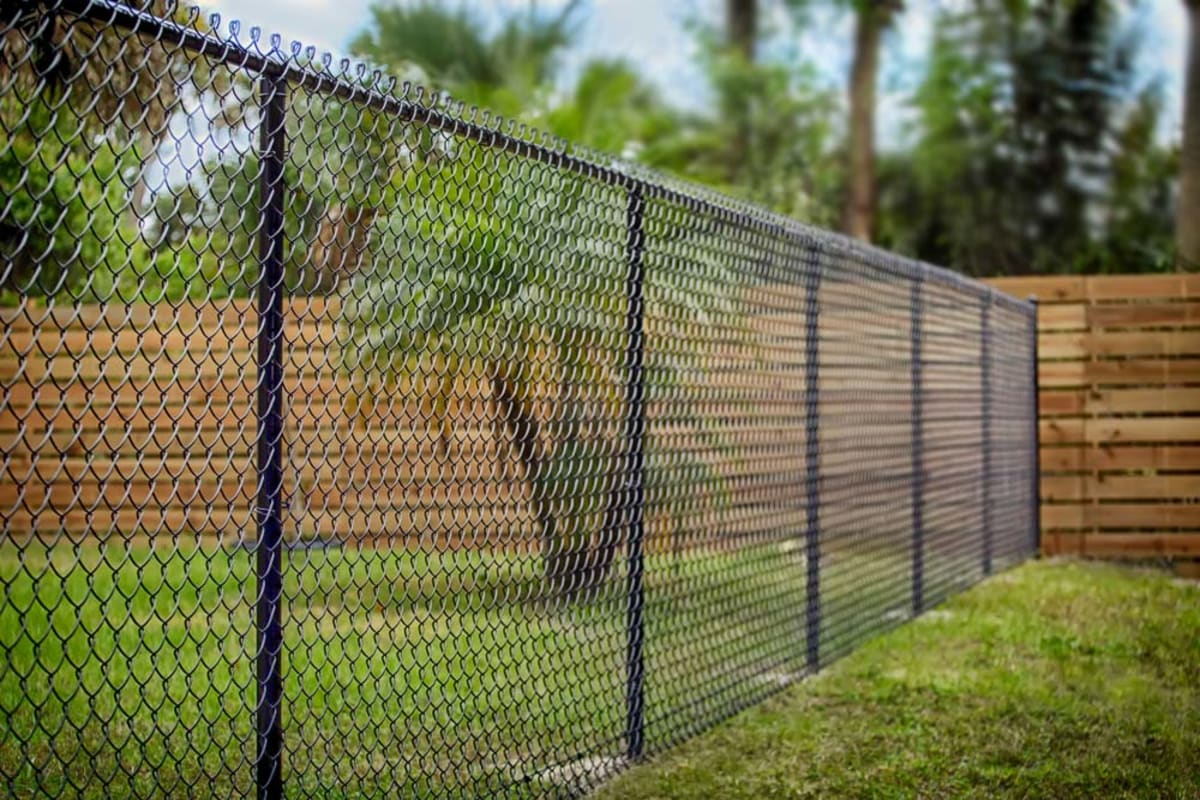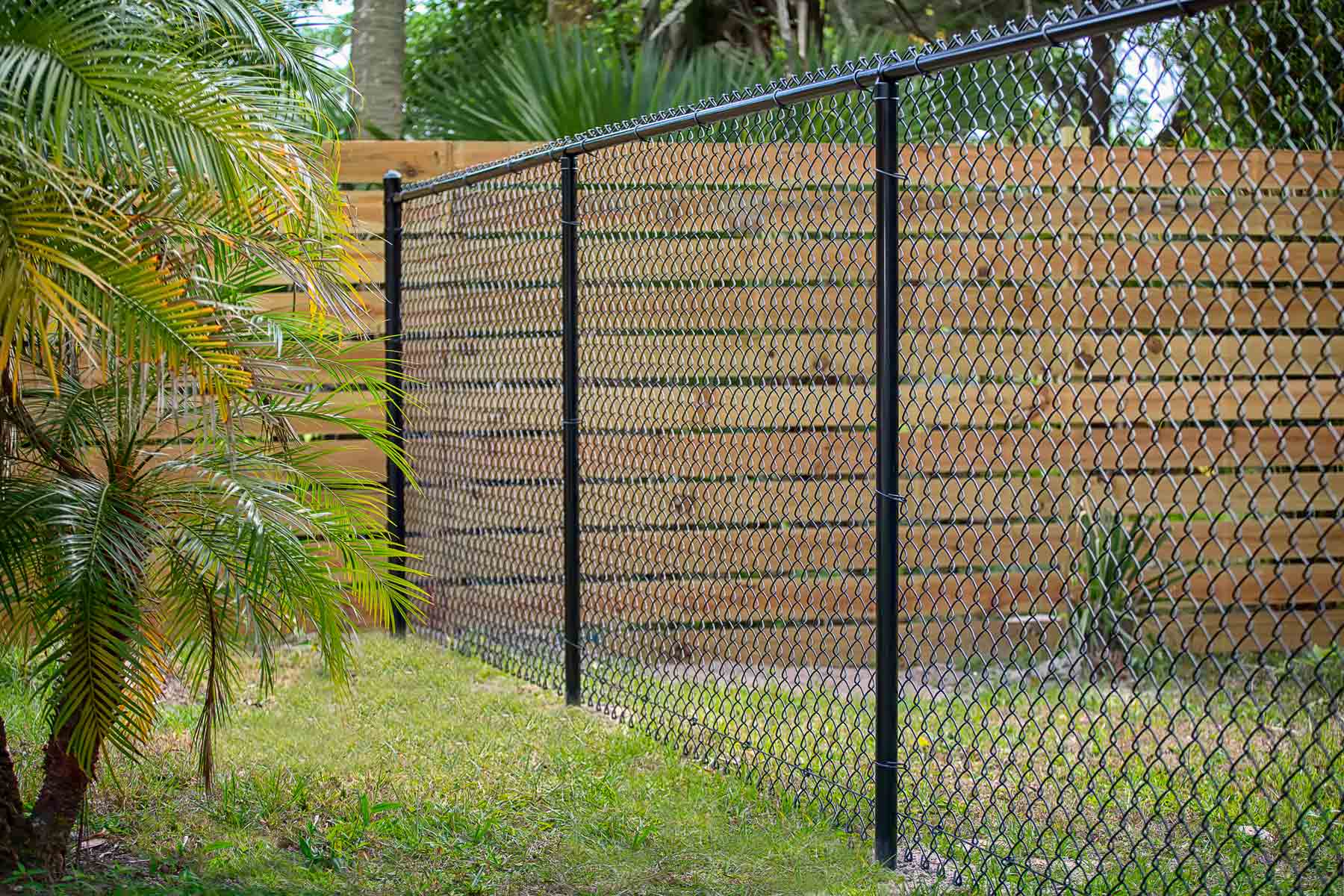
How much does a chain-link fence cost?
How much does a chain-link fence cost?
$10 – $40 average cost per linear foot
$1,500 – $6,000 average total cost (150 feet)
Chain-link fence cost
A chain-link fence costs $10 to $40 per linear foot installed on average, or about $1,500 to $6,000 total for 150 feet. Chain-link fence installation costs $5 to $20 per linear foot for labor alone, or about half the total cost. The cost of a chain-link fence depends on the location, height, length, material, and features.
| Fence length (feet) | Average installed cost |
|---|---|
| 50 | $500 – $2,000 |
| 100 | $1,000 – $4,000 |
| 150 | $1,500 – $6,000 |
| 200 | $2,000 – $8,000 |
| 300 | $3,000 – $12,000 |
Chain-link fence cost per foot
The cost of a chain-link fence varies depending on the fence's height. A 4-foot-high chain-link fence costs $10 to $20 per linear foot installed on average and is common for front yards. Most backyard chain-link fences are 6 to 8 feet high, ranging from $15 to $40+ per linear foot installed.
| Fence height | Material price (per linear foot) |
Installed cost (per linear foot) |
Common usage |
|---|---|---|---|
| 4 feet | $5 – $10 | $10 – $20+ | Front yard |
| 6 feet | $8 – $15 | $13 – $30+ | Back yard |
| 8 feet | $10 – $20 | $20 – $40+ | Back yard |
Chain-link fence installation cost factors
Several factors influence the final cost of chain-link fence installation:
Length: Length has a major impact on chain-link fence installation cost. Each additional foot adds both material and labor expenses to your project, so fencing a bigger yard naturally costs more.
Height: Taller fences cost more because they require more materials and additional labor. Fence height also affects local permit requirements.
Number of posts: Posts are needed every 6 to 10 feet and cost $15 to $30+ each. Corner posts and gate posts require larger, more expensive terminal posts.
Mesh size: The standard mesh size is 2 inches, but smaller 1-inch mesh provides better security. However, reducing the mesh size can double or triple your costs. Diamond pattern options include:
2" x 2" mesh (standard residential)
2.25" x 2.25" mesh (economy option)
1" x 1" mesh (high security)
Permits: Most cities require a permit for fence installation. Building permits for chain-link fences cost $40 – $150+, depending on fence height, location, local building codes, and the property type (residential vs. commercial).
Labor
Labor accounts for about 50% of the total installation cost for a chain-link fence. Fence installers charge $25 to $50 per hour, with most projects taking 2+ days to complete. Professional installation often includes:
Site preparation and layout
Post hole digging and setting
Fence panel installation and tensioning
Gate installation and adjustment
Cleanup and debris removal
Depending on the crew size, contractors install 80 to 150 feet of fence per day. Labor costs increase for taller fences, hard or rocky soil, and uneven or difficult terrain that requires additional time and equipment.
Wire gauge
Wire gauge refers to the thickness of the metal wire used in the fence. The smaller the gauge number, the thicker and stronger the wire. Most residential chain-link fences use 9- to 12-gauge wire, while commercial properties often choose 6- to 9-gauge for added durability.
| Wire gauge | Cost | Thickness | Best for |
|---|---|---|---|
| 6 gauge | $$$ | Thickest | High security, industrial |
| 9 gauge | $$ | Medium-thick | Commercial, heavy residential |
| 11 gauge | $ | Standard | Residential properties |
| 11.5 gauge | $ | Thin | Temporary fencing |
Fence type
Different chain-link materials offer varying levels of durability, appearance, and cost. Each type serves specific needs and budgets. Galvanized chain-link fences are the most common, with a zinc coating that offers rust resistance at an affordable price point.
| Fence type | Installed cost (per linear foot) |
Details |
|---|---|---|
| Galvanized | $10 – $40 |
|
| Vinyl-coated | $30 – $60 |
|
| Wood post chain link | $20 – $50 |
|
| Wrought iron post chain link | $35 – $100 |
|
Gates
Chain-link fence gates cost anywhere from $80 to $1,000+ before installation, depending on size and type. Simple swing gates are the cheapest option, while rolling and cantilever slide gates can significantly increase your total project cost. However, a slide gate may be necessary depending on the width of the gate and available space.
| Gate type | Size range (width) | Average price* |
|---|---|---|
| Single swing (walk-through) | 3' – 6' | $80 – $200 |
| Double swing (drive-through) | 8' – 12' | $175 – $500 |
| Rolling (slide) | 12' – 20' | $350 – $1,000+ |
| Commercial cantilever | 6' – 30' | $1,200 – $3,000+ |
*Not including installation
Swing gates require enough space to swing open, while rolling gates require enough space to roll back fully.
Cantilever gates need extra length for the counterbalance section to keep the fence off the ground.
Customization
Customizing a chain-link fence with additional features and finishes can significantly affect the overall cost. The table below shows common custom options and their average price ranges.
| Feature | Average cost |
|---|---|
| Privacy slats | $5 – $18 per linear foot |
| Privacy fabric screens | $2 – $6 per linear foot |
| Decorative post caps | $5 – $25 each (materials only) |
| Barbed wire topping | $1 – $3 per linear foot |
| Custom colors | 10% – 20% premium over standard cost |
| Landscaping restoration | $50 – $100+ per hour |
Site prep
Beyond the basic fence and labor, several site preparation expenses can affect the total cost to install a chain link fence. A land survey costs $300 to $900 on average to confirm your property lines and ensure you don't build a fence on your neighbor's yard. Other costs may include:
| Service | Average cost |
|---|---|
| Tree removal cost | $150 – $500+ each |
| Stump removal cost | $100 – $400 each |
| Debris clearing cost | $50 – $150 per hour |
| Old fence removal | $3 – $5 per linear foot |
| Yard grading cost | $500 – $1,000 (small yard) $1,000 – $5,000 (average backyard) |

Cost of chain-link fence vs. other types
Fencing prices range from $10 to $60+ per linear foot installed, depending on the type. A chain-link fence almost always beats wood on price, but it lacks the aesthetic appeal wood can add. The table below shows several common fence types and costs.
| Fence Type | Installed cost per linear foot | Average lifespan (years) |
|---|---|---|
| Chain-link fence | $10 – $40 | 15 – 20 |
| Wood picket fence cost | $10 – $40+ | 15 – 20 |
| Wood privacy fence cost | $25 – $60 | 15 – 20+ |
| Split rail fence cost | $15 – $35 | 10 – 30 |
| Vinyl fence cost | $30 – $60 | 20 – 30 |
| Aluminum fence cost | $25 – $75 | 30 – 50 |
| Wrought iron fence cost | $50 – $85 | 50 – 100 |
Chain-link fence FAQs
What is a chain-link fence made of?
A chain-link fence is made from interwoven steel wires, forming a diamond-shaped mesh. Most chain-link fences consist of galvanized steel wire mesh, steel posts, top rail and bottom tension wire, hardware fittings and ties, plus optional gates and accessories.
Is a chain-link fence cheaper than wood?
Yes, the cost of a chain-link fence is usually lower than wood fencing. Chain-link fencing also offers lower long-term costs due to its minimal maintenance requirements (no painting or staining needed), resistance to weather damage, and longer lifespan in many climates.
Can you paint a chain-link fence?
Yes, you can paint chain-link fences to improve appearance and add extra protection. Painting a chain-link fence costs $4 to $7 per linear foot for the materials and labor. When painting, use rust-inhibiting primer first and choose paint designed for metal surfaces. Clean the fence thoroughly before painting and expect to repaint every 3 to 5 years for best results.
Can you electrify a chain-link fence?
Yes, it's possible to electrify a chain-link fence for enhanced security. However, this requires professional installation by licensed electricians, compliance with local electrical codes, proper warning signs and safety measures, and regular maintenance and inspection. Work with a qualified local electrician to ensure proper and safe installation.
Can you install a chain-link fence without concrete?
While concrete is recommended for stability, it's possible to install a chain-link fence with driven posts in certain soil conditions. However, concrete footings provide better long-term support, especially for taller fences or areas with strong winds.

Hiring a chain-link fence installer
Professional installation ensures your fence meets local codes and provides long-lasting performance. Follow these guidelines when searching for a qualified chain-link fence installer near you:
Check references from past clients and examine reviews on HomeGuide and Google.
Verify their licensing, American Fence Association certification, or OSHA endorsements.
Compare at least 3 estimates from contractors with several years of experience.
Avoid companies with unusually low quotes, as quality may suffer.
Never pay in full before work begins.
Get detailed estimates and warranties in writing.
Ensure all materials and labor costs are itemized.
Verify the contractor has proper insurance and workers' compensation.
Confirm they will obtain necessary permits and mark utility lines.
Questions to ask a chain-link fence pro
When interviewing potential contractors, ask these important questions:
How many chain-link fences have you installed?
Are you licensed and insured?
Do you have American Fence Association certification?
Can you provide local references?
Do you know local fence-building codes and post-hole size requirements?
Which color choices do you offer, and do costs vary?
Will you help mark utility lines before work begins?
Are permits required, and will you obtain them?
What's your timeline for completion?
How long is the warranty on your work?
Do you charge for debris cleanup?
Can you place the fence on the property line?
Do you include gates in the base price?